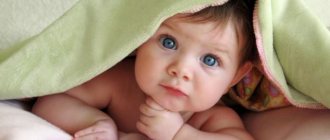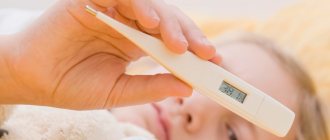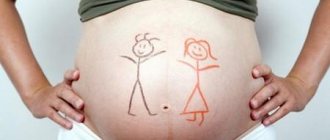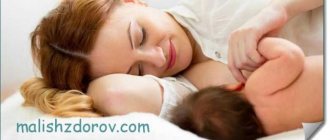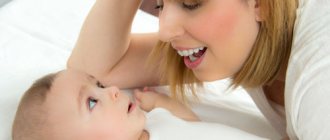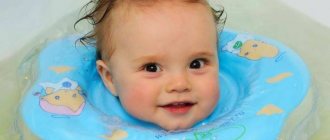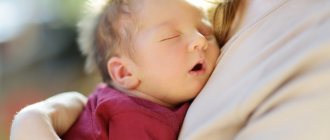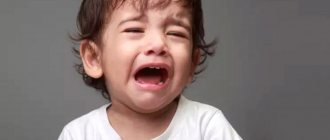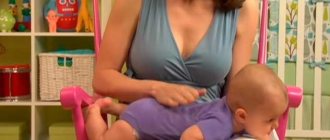The baby spent 9 months in the stomach, the sounds were muffled, there was no bright light. He felt everything through the dense layer of the bladder, as well as his mother’s belly. After birth, the situation changed dramatically. Now the baby faces all the loud sounds and flashes of light on his own. There are several reasons why a baby may be shaking.
Why does a newborn’s chin shake, reasons:
- Neurological. Associated with the immaturity of the nerve fiber system, which responds inadequately to a variety of stimuli.
- Hormonal. This is due to the fact that the adrenal glands produce large amounts of norepinephrine. It appears as a result of a stressful situation; for a baby it can be a flash of light, a loud sound, or sudden movements, its movement.
Cry
Why does a newborn's chin and lower lip shake?
Accordingly, the easiest option to calm the baby is to normalize sleep and wakefulness, and try to irritate the baby’s nerves less. By 3 months, the baby’s system of nerve endings is normalized, most of the reflexes that he had immediately after birth disappear, and new ones characteristic of adults take their place. Thus, the shaking of the chin, limbs, and lower lip stops. If you don’t know why your newborn’s chin and lower lip are shaking, contact a neurologist.
Normal shaking behavior in newborns:
- If the baby hears a loud sound or scream.
- Immediately after waking up, the mother turned on the light, the baby may shudder sharply, cry, scream. A shaking chin may occur with these symptoms. This is a variant of the norm.
- If the baby is cold. This often happens at an appointment with a pediatrician, especially in winter, when the baby needs to be undressed in order to weigh and measure his growth.
- If the baby is hungry or went to the toilet. How simple processes are for an adult, are a burden for a baby. After all, in the stomach, nutrition occurred through the placenta; the baby himself did not eat anything. Now he needs to try to suck milk from his mother's breast, so hunger, and even normal bowel movements can cause shaking. Some mothers use this sign to determine when the baby goes to the toilet, and use this phenomenon to potty train the baby.
The baby is crying
A newborn's chin and leg are shaking, is this dangerous?
If you notice that your newborn's chin and legs are shaking , it's time to go for a consultation. Shaking one part of the body, lower or upper limbs is an alarming signal.
When chin shaking is not normal:
- When the baby is 3 months old, the symptoms not only do not decrease, but get worse. That is, if, along with the shaking of the chin, the shaking of the head, arms and legs is connected.
- A very alarming symptom is shaking at the same time of the chin and one part of the body, for example the right. It is necessary to urgently contact a neurologist if the baby's lower sponge is walking, along with shaking of the right, left arm or leg. That is, movements and spasms are not general, but in certain areas of the body.
- Shaking occurs regardless of the presence of irritants. That is, the chin and head shake not in response to stimuli, but even in a calm environment.
- If shaking occurs at night. When the baby sleeps, he is in a calm state, so there should be no tremor.
Baby
Problem or not
Doctors believe that up to 3 months of age, chin tremor in newborns is normal. Both arms and legs may tremble. But most often it is the lower part of the face that shakes. All this only means that the baby’s nervous system is just developing.
In order to understand whether tremors are really a symptom of any disease, you should closely monitor the baby.
- You should understand exactly when the chin is shaking: when overexcited, this is the norm, but if tremors occur in a calm state, it is worth checking whether the baby is cold or hungry. In absolute rest, without any reasons for stress and physical tension, without hypertonicity, it is difficult to call trembling normal, but this sometimes happens.
- The chin can shake during physical stress, and this is the case with feeding, because the baby intensively sucks milk, and during a tonic massage.
- When a baby cries, the lower part of the face may also shake quite violently.
In any case, babies are regularly examined by a neurologist, to whom you must report tremors. And it’s up to the doctor to decide whether there is a problem or not. You should really be concerned if the trembling continues after the child reaches 3 months or longer.
Symptoms that, together with a shaking chin, indicate the presence of diseases and problems include:
- tremor in infants, not only of the lower part of the face, but also of the entire head;
- when shaking, the baby turns blue and sweats;
- If the birth was quite difficult, it is imperative to be examined by a neurologist.
Why does a newborn's chin shake when at rest?
If there are no irritants, then shaking is a symptom of a neurological disease.
Why does a newborn's chin shake when at rest?
- Difficult birth . Fetal hypoxia, vacuum, squeezing out crumbs often cause birth injuries and neurological disorders. Thus, strong pressure is placed on the child’s skull, which can result in hematomas, hemorrhages and intracranial pressure. Which negatively affects the nervous system of the baby and is a pathology.
- Difficult pregnancy , sudden cessation of psychotropic drugs, alcohol and cigarettes. That is why pregnant women are not recommended to suddenly quit smoking, but to do it gradually so that the child does not go into shock or have problems with nerves.
- Infections in pregnant women . If a woman has suffered from some illness in an interesting position, this may affect the child’s health. The virus greatly weakens the child’s system of nerve endings and can cause various pathologies and problems in the baby’s organs and systems.
Baby
Causes of a shaky chin
Infant chin tremor is primarily a signal of an immature nervous system. In newborns, the adrenal glands are not yet mature and do not work effectively enough. That is, there are two main reasons for this “symptom”:
- it is neurological immaturity;
- hormonal immaturity (the adrenal glands release excessive amounts of norepinephrine into the blood, which is a response to stressful situations, and this in turn excites the nervous system.
Hypertonicity is an additional burden on the baby’s body, so muscles and organs simply cannot work fully yet.
There are other reasons that doctors associate with a trembling chin:
- difficult childbirth and any birth trauma can cause oxygen starvation, resulting in problems in the functioning of the nervous system;
- overexertion may occur due to the fact that the baby is hungry or cold;
- Mom's stress during pregnancy also leads to instability of the nervous system after childbirth;
- A difficult pregnancy can also lead to complications.
What to do if your newborn’s hands are shaking?
In order to quickly cope with problems, you need to follow a number of simple rules.
What to do if your newborn’s hands are shaking:
- First, before going to bed, be sure to bathe your baby in slightly warm water with the addition of motherwort and valerian tinctures. These baths are very calming and normalize sleep. Some pediatricians recommend adding a couple of drops of lavender oil to bathing water. There is no need for the smell to be very strong, just a faint scent is enough to calm the child.
- Be sure to give your baby a massage. This is not necessarily a special complex; light stroking and more intense movements are enough. You need to learn several simple techniques, including stroking, tapping, and kneading.
- Below in the video you can see how to massage newborns. Any massage leads to normalization of muscle tone, so spasms will occur much less frequently. Be sure to feed your baby at the same time and teach him a certain routine. Try to go for walks at the same time and put your child to bed at certain hours. This will help normalize the functioning of the nervous impulse system. Thus, the baby gets used to this daily routine, and situations that may disturb his nerves will disappear.
What to do if a newborn’s chin shakes when crying?
Crying is stressful for a baby, so shaking is a response to stimuli.
What to do if a newborn’s chin shakes when crying:
- Do not overcool your child; dress him according to the weather. When a baby screams or cries, under no circumstances should you calm him down with a rattle. This further weakens the child’s nervous system. Pick him up and rock him. Try to keep the house calm, without shouting, scandals or loud sounds.
- When performing a massage, turn on calm, classical music. The child should get used to white noise, it calms him down. In the future, the child will not need silence in order to fall asleep.
- He will fall asleep calmly in fairly noisy conditions. However, the sounds should in no case be sharp or very loud. Avoid turning on bright lights during feeding periods at night. Leave the night light on, or dim the lights as much as possible.
The baby is crying
What are the causes of a shaky chin?
A little person in the house is a joy. But all women who have experienced the joy of motherhood will confirm my words: along with happiness in the form of a beloved baby comes fear and anxiety. Parents notice strange actions in the child: he is clumsy, smiles with one corner of his lips, eats awkwardly, etc. It is not always possible to understand whether a child’s behavior is justified by his age or whether he is behaving somehow suspiciously.
In newborns, absolutely any action can be either physiological or pathological.
Let's look at the example of a shaky chin.
1.1. Physiology
- The body is at the stage of development. It is quite normal if the baby’s lower lip trembles (in medical parlance, trembling is called “tremor”) when crying. The internal organs are just beginning to function fully, but the baby is not yet able to control himself and his behavior. Everything in this world is new to him - he’s so used to living in his mother’s womb!
- Stress. Since the baby is not yet strong and has not mastered his new role, he begins to get nervous. Parents may notice that a loud sound causes the baby's lower lip to tremble: the baby has not yet understood whether it is worth crying in this case - or whether such a sound is quite normal in this world (different from womb life).
1.2. Pathology
Here everything is much more serious; it is likely that the child was injured during birth or while “living in the tummy.”
The following can harm the unborn baby:
- Excessive amount of amniotic fluid.
- Difficult labor (weak labor), sudden birth, caesarean section.
- Entwining the baby with the umbilical cord.
- Infectious diseases of the mother during pregnancy.
- Severe stress suffered by the parent during pregnancy.
- Trauma during childbirth itself.
Such reasons can lead to disruption of the nervous system (already unstable). Hence the chin tremor.
My baby's chin is shaking, what should I do?
If there are symptoms that cause concern, be sure to contact a neurologist. There are several mandatory examinations, one of which is at 3 and 6 months.
The baby's chin is shaking, what to do:
- Usually the child is prescribed sedatives, such as Glycine, Pantogam. Relaxing massages and baths are also often recommended. If necessary, the doctor will write out a referral for a special massage. It is carried out in entire courses; if necessary, parents can master massage techniques themselves during a consultation with a specialist.
- Be sure to follow all the doctor’s recommendations, as the child’s health and development directly depend on this. In order for the baby to develop normally, be sure to follow all the rules and organize a daily routine. Bathing in a bathtub with a small inflatable collar is very beneficial for a child. Thus, this allows the child to move his arms and legs freely and swim.
- Water has a very good effect on the child’s muscular system, relaxing it. After such a bath, the child very often falls asleep. Try to massage 1 hour before feeding. In no case should you do it before bed, as it stimulates and can cause awakening and sleep disturbances. It is best to massage immediately after waking up, 1 hour after feeding, or an hour before it. If the baby screams, worries, or resists, postpone the massage until the child calms down.
After feeding
Treatment
First of all, you should make the environment around the baby calm and the daily routine stable. If tremor is observed only during stress, then there is no need to worry too much, but you need to arrange your life in such a way as to reduce the impact of stressful situations on the baby.
If doctors indicate hypertension, you should do a relaxing massage. It is not necessary to call a specialist for this - your pediatrician will also show you a few simple exercises. Baths with herbs that calm the nervous system will help if the baby is not allergic to the selected plants.
If necessary, a neurologist will prescribe more serious treatment, depending on what specific problems are diagnosed during the examination. One of the most common causes of this condition is called oxygen starvation, then doctors prescribe drugs that improve the supply of oxygen to brain cells, stimulate its rapid maturation and normalize the functioning of the nervous system.
Whatever the treatment prescribed by doctors, many still consider the most important factor to be the calmness of the mother, because her condition is transmitted to the baby, who is sensitive to the stress, anxiety, and tension of the mother in labor. However, older children always feel their mother even from a distance, so it is important for the parents to first put their nervous system in order.
A newborn's chin shakes: reviews
Below you can read reviews from mothers who encountered a similar problem.
A newborn's chin is shaking, reviews:
Elena, Gleb's mother, 4 months. Our problem with a shaking chin was observed from birth, and by 3 months it had not disappeared. The birth was very difficult, so immediately after birth we were registered with a neurologist. The doctor prescribed Glycine, Pantogam, and soothing baths. Now the situation has improved significantly, but the child is still very restless and does not sleep well. We try to calm the child down and establish a daily routine. We walk outside a lot.
Olga, mother of Matvey, 1 year old. Matvey was born to us as a healthy child, but the birth was very rapid. Therefore, until three months, I sometimes observed shaking of my chin. At a pediatrician's appointment at 6 months, the doctor noticed that the child had shaking of the lower lip. We were given a referral to a neurologist. During the examination, the doctor did not notice any obvious abnormalities; they did an ultrasound of the brain. No serious violations were identified; we were simply prescribed a relaxing massage. Now the child is a little over a year old, and there is no tremor, the baby is developing according to his age.
Oksana, mother of Sonya, 6 months. Unfortunately, the daughter appeared earlier than planned. She gave birth to a child at 7.5 months, he was premature, and his nervous system was unstable. Until she was 4 months old, she practically did not sleep and screamed constantly. There were also problems, frequent regurgitation. At the same time, tremors were observed in the arms, legs and chin. We were prescribed Ceraxon or Neuroxon. We chose a more expensive analogue of these drugs. We took Somazin syrup, as well as Glycine before bed. The medications helped, everything returned to normal. Nowadays, shaking of the chin is observed very rarely, and only in cases where there is an irritant. That is, if the child is cold or a loud sound is heard.
Crying
A lot of interesting things for young mothers can be found in the articles below:
- What kind of stool should a breastfed newborn have?
- What is normal room temperature? What temperature should the room be?
- How to calm a newborn, baby, child before bed?
- White, pink noise for newborns to help baby fall asleep
- Why does a newborn baby sleep with their eyes slightly open or slightly open?
A neurologist will check the child’s reflexes and be able to judge the baby’s development and the state of the nervous system. If the child is restless, often spits up, and the head is thrown back along with shaking of the chin, most likely the child has intracranial pressure. If you start treatment on time, there will be no consequences.
